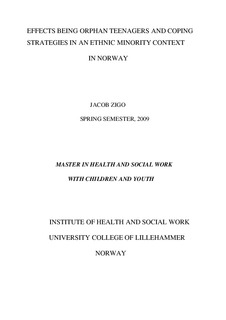| dc.description.abstract | This study attempts to explore some of the effects orphans children migrated into Norway can experienced after the dead of their parents and the strategies they used in coping with these challenges they meet in their new environment, Norway. Four orphans participated in this study. My focus is based on the description of their experiences, feelings, life and challenges. Moreover it has been of importance to find theories which can enlighten someone to get a better understanding about what has happened to the lives of these orphans and to see how the children can help themselves, and also achieved some help from their host country Norway. Hermeneutical approaches with the use of qualitative methodology have been the main form of description used in this study. This is because it places special emphasis on these four orphans’ views, personal experiences, attitudes, beliefs, feelings and emotions. All the discussions and analyses are based on the orphan’s descriptions. Generally, being an orphan, might affect all dimensions in these children lives in Norway. Lose of both parents is characterized by strong and mixed feelings. When both parents die, children do not only experienced grief and lose to be the only challenging factors. They also experienced fear, conscious of maybe the cause of their parent’s dead, anger, attachment problem to their new caregivers and social problems to their new land. The children also lost hopes, dreams and expectations of the future. The question of how these children will cope with all these loses, and the expected challenges in the new land are difficult to answer. Finding methods in regaining meaning in their lives is a long and difficult process. Despite all these challenges faced by these orphans, they still developed some coping
strategies to adapt in these adversities. Resilience theory has been a helping hand for these children to deal with their stresses. Moreover, some of the positives experiences like the orphans first meeting with the Norwegian police, and the help they got both from their caregivers and the Norwegian state have helped them to adapt into the Norwegian society. The result of this study has proved much more alike for all of the four orphans who participated in the study. They had strong attachment to their parents. All of them experienced sadness and sorrow. All of them felt what has happened to them has caused some difficulties in their lives, but none considered it as what could make them lose control over their lives. Lose of parents can be considered as fundamental changes that has occurred to these children lives, and which can always affect their well being. | en_US |
